There’s nothing like a homemade pretzel. With a shiny, amber crust and a light but chewy texture, these Sourdough Soft Pretzels are delicious and just as satisfying as a pretzel you can buy at a store. These are naturally-leavened using sourdough starter and no commercial yeast which makes them even more flavorful than your average pretzel.
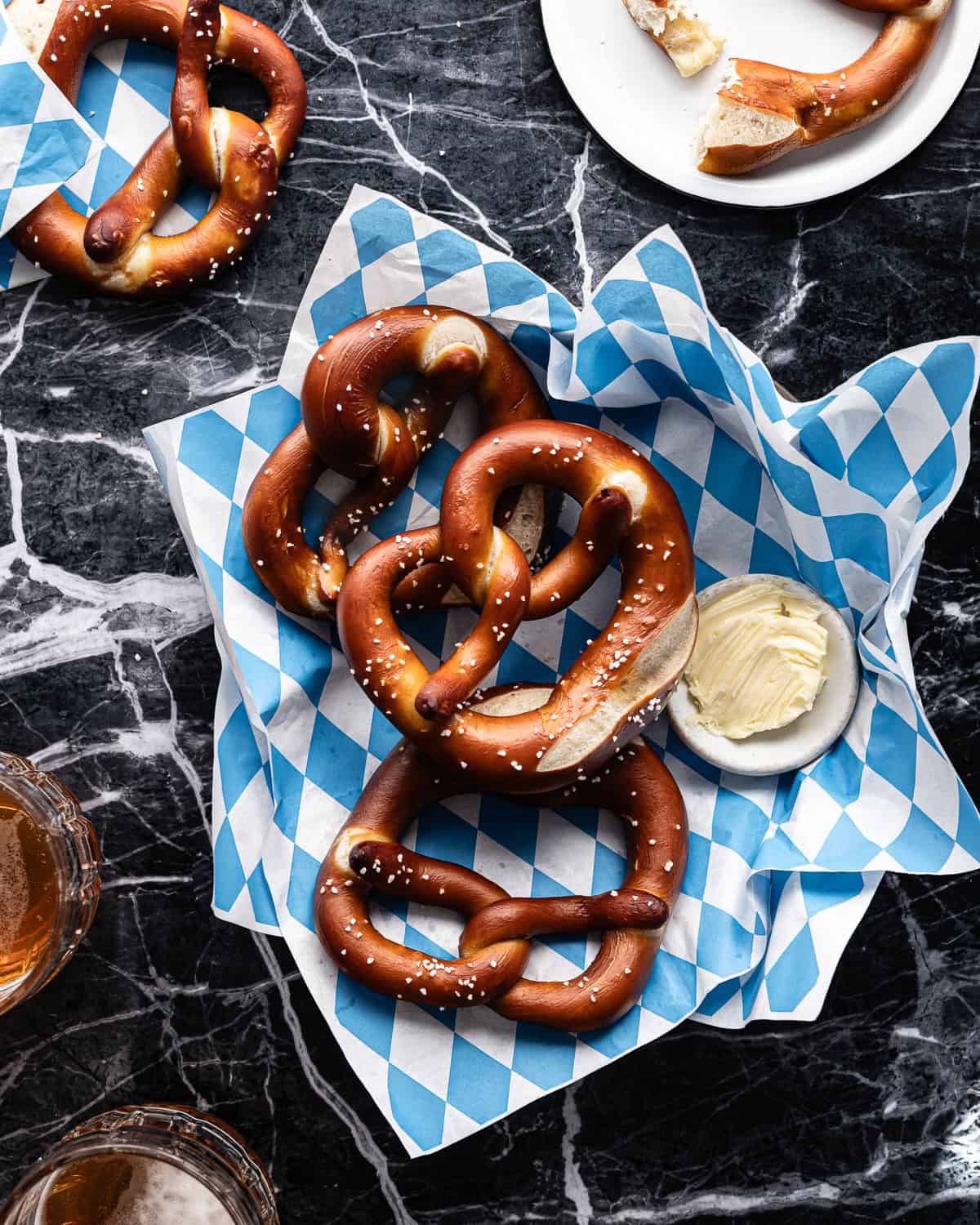
This recipe was originally published in Oct. 2022. It has since been republished with step-by-step photos and tips for success.
Jump to:
- What makes pretzels special
- Ingredients and Substitutions
- Equipment
- Sourdough Soft Pretzels Variations
- How to Make Sourdough Pretzels
- What is the Windowpane Test?
- Pretzel Shaping Tips
- Working with Lye
- Baker's Tips
- I'm scared to use lye. What can I use instead?
- Recipe FAQs
- More sourdough bread recipes you may like
- Sourdough Pretzels Recipe
I usually make these pretzels at least once a year for our at-home Oktoberfest celebration. My boyfriend requests them all-year long and doesn’t stop until I bake our yearly batch. Each year, they’ve come out better and better and now, I’m finally ready to share my soft sourdough pretzel recipe with you! There are a few steps involved and you’ll have to invest some time when making these homemade pretzels but the effort is well worth it.
I just made pretzels for the first time using my starter and I’m so beyond pleased and happy! I’m saving this for sure...They came out beautiful 🙂 thank you!
- Jasmine
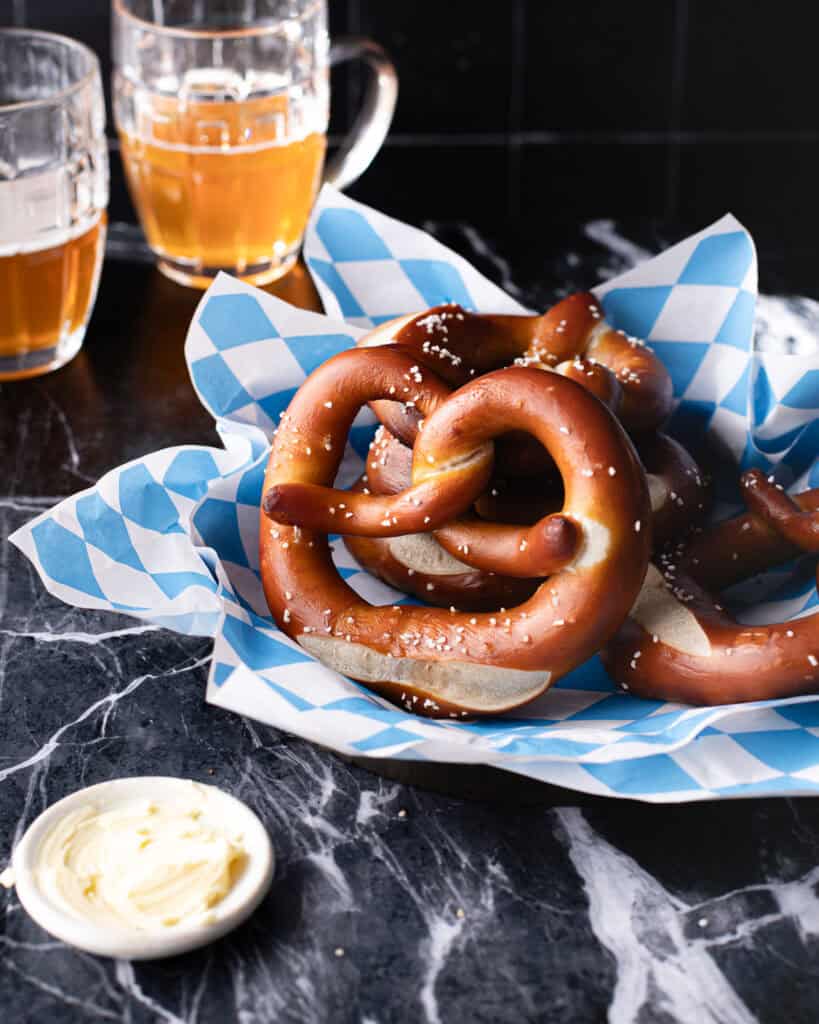
What makes pretzels special
Pretzels start out like most other sourdough bread, with bread flour, water, salt and a little bit of butter. What makes them unique is their iconic pretzel shape, golden brown, amber, shiny crust, chewy texture and a soft, tight crumb. To create a good pretzel, you’ll need to use a high-protein flour (12 to 14% protein content), develop a strong gluten network and dip your pretzel dough in an alkaline solution before baking.
Love this sourdough soft pretzel recipe? Check out my delicious recipes for sourdough bagels and sourdough bialy.
Ingredients and Substitutions

Bread flour: High protein flour is essential for chewy pretzels, do not substitute all-purpose flour or your pretzels will turn out wrinkly.
Active Sourdough starter: Make sure your sourdough starter is healthy, mature and active before attempting this recipe or your dough won't rise and your pretzels will be dense and gummy.
Barley malt syrup: An unrefined sweetener made from barley, it adds a delicious malty flavor to these pretzels. Substitute molasses or brown sugar.
Pretzel salt: A special large-grain salt that won't melt during baking. You can substitute flaky sea salt in a pinch, but it will melt while the pretzels bake.
See recipe card for detailed ingredient information.
Equipment
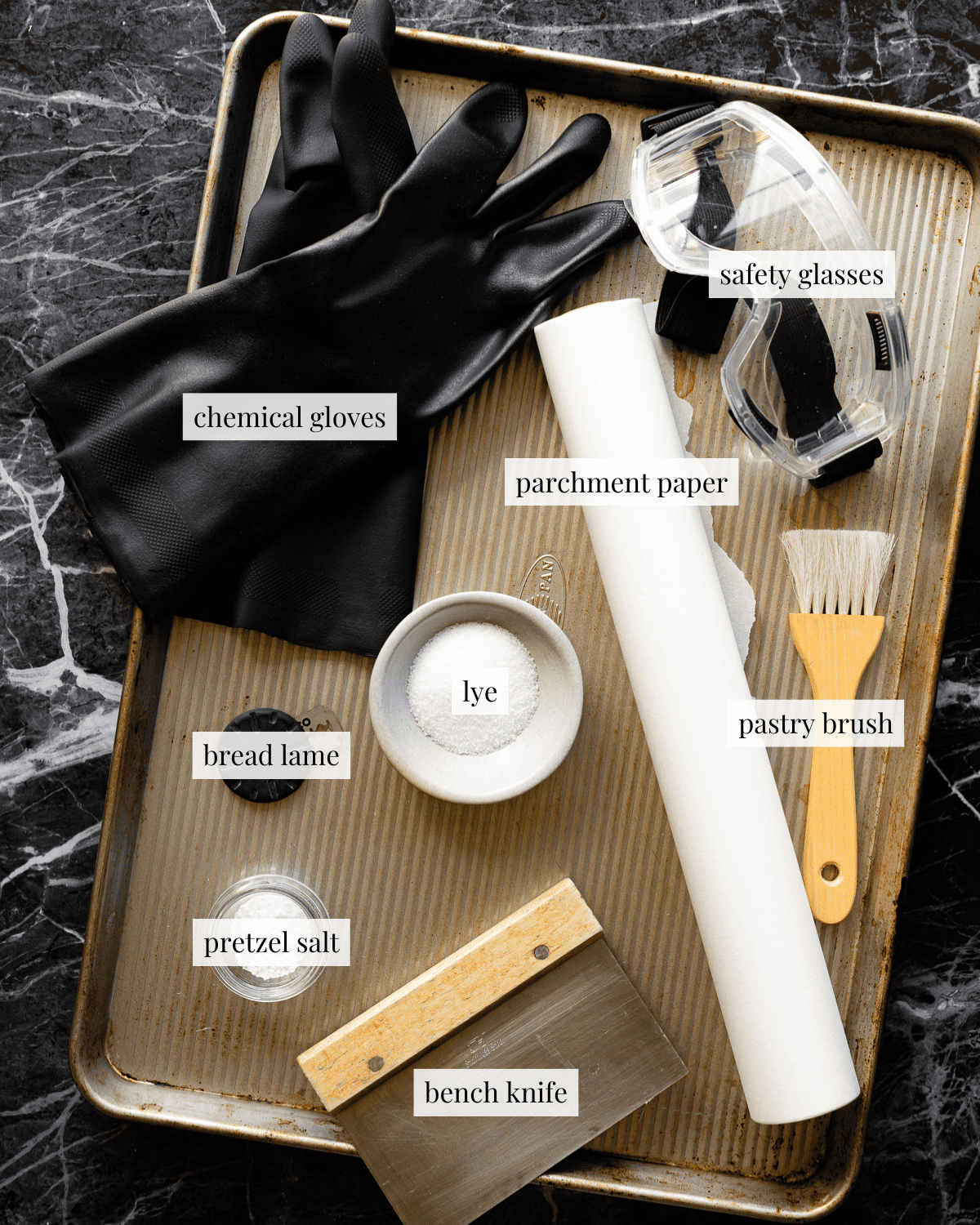
Lye: Mixing lye with water creates a highly alkaline solution that gives pretzels their distinctive flavor, deep color, and chewy texture.
Chemical gloves: Allows you to handle dough safely, lye is extremely caustic and can cause severe skin irritation upon contact.
Safety goggles: Protects your eyes in case of splashing.
See recipe card for detailed equipment information.
Sourdough Soft Pretzels Variations
Cinnamon Sugar Pretzels: Instead of pretzel salt, sprinkle cinnamon sugar on the sourdough pretzel dough after the lye bath and before baking.
Jalapeno Cheddar Pretzels: Add diced jalapenos and cheddar cheese to the pretzel dough.
Buttered Soft Pretzels: Brush melted butter right after the pretzels are baked, this will soften the crust and add a rich buttery flavor.
How to Make Sourdough Pretzels
STEP 1: Make the dough
Activate your sourdough starter. Whisk the barley malt syrup and sourdough starter into the water. Add the flour and salt, knead until a shaggy dough forms. Knead the butter into the dough.

STEP 2: Knead the dough
Knead the dough until it looks smooth and passes windowpane test.

What is the Windowpane Test?
A strong gluten network is key to chewy pretzels with a shiny crust, while insufficient gluten development leads to bready, wrinkly pretzels. The windowpane test helps check if the gluten is developed enough in your dough. To perform the test, stretch a small portion of the dough until you can see the outlines of your fingers. If it tears, more kneading is needed.
STEP 3: Bulk fermentation
Round the dough into a tight ball. Transfer the dough into a clean, lighty-oiled bowl and cover with plastic wrap. Let the dough rise in a warm place until doubled in volume. Deflate the dough, cover with plastic wrap and let the dough proof in the refrigerator overnight.

STEP 4: Pre-shape the dough
Divide the dough into 8 portions. Round each portion of dough into a tight ball. Gently roll each ball into a short log. Cover the logs with plastic wrap to prevent them from drying out. Let the dough rest for 15 mins.

Tip
Pre-shaping prepares the dough to take its final form and makes it much easier to roll the dough into long ropes.
STEP 5: Shape the dough
Roll the dough into a 24 to 28-inch rope that's thicker in the middle with tapered ends. Make a "U" shape with the dough. Twist the ends together. Flip the ends down and tack them to the sides.

Allow the dough to proof at room temperature for 1 ½ to 2 hours covered with plastic wrap. Then transfer the dough to the refrigerator and chill uncovered for at least 1 hour.
Pretzel Shaping Tips
- If your dough is difficult to roll out and continues to snap back, let it rest for another 5 to 10 minutes before continuing.
- Don't use flour on your work surface, the dough needs to stick to the work surface for it to lengthen into a long rope.
- Work with 1 portion of dough at a time and keep always keep the remaining portions of dough covered to prevent it from drying out.
- Apply downward pressure while sliding your hands outward, avoid stretching the dough, this will cause your dough to snapback or tear.
STEP 6: Lye bath
Whisk the lye into the cold water. Slowly dip the pretzel into the lye solution. Submerge the dough for 15 to 20 seconds. Carefully transfer the dipped pretzel onto a wire rack.

Working with Lye
- Use a non-reactive bowl like glass or stainless steel, as lye can corrode some materials.
- Use safety goggles and chemical resistant gloves. Be careful and avoid contact with your skin.
- Submerge your dough fully in the solution to achieve a evenly colored crust.
- Grasp the dough at the tips to prevent the pretzels from unraveling while dipping them in the lye solution.
- Don't dip your dough for too long or your pretzels will turn out gummy.
- Rinse tools immediately to prevent damage.
- Dispose of the lye in your sink or flush it down the toilet.
Looking for a quick pretzel recipe that doesn't use lye? Try my Sourdough Discard Soft Pretzels.
STEP 7: Bake the sourdough pretzels
Sprinkle pretzel salt (if using) and score the thick portion of the pretzel (the belly) with a bread lame fitted with a sharp blade. Bake the pretzels at 450 F for 20 to 25 minutes.

Baker's Tips
- Use weight over gram measures. Measuring ingredients with a scale is more accurate than using cups or tablespoons.
- Make sure your starter is healthy, active and mature before attempting this recipe.
- Coat the parchment paper with a thin layer of vegetable oil to prevent the pretzels from getting stuck as they bake. Wipe off any excess oil so the bottom of your pretzels do not fry as they bake.
- Halfway through baking, lift the pretzels from the parchment paper using a frying spatula, this will prevent them from getting stuck to the parchment paper.
- Start with the dough at the top of your bench, and roll towards your body, try not to go back and forth since this will cause the dough to weaken and tear.
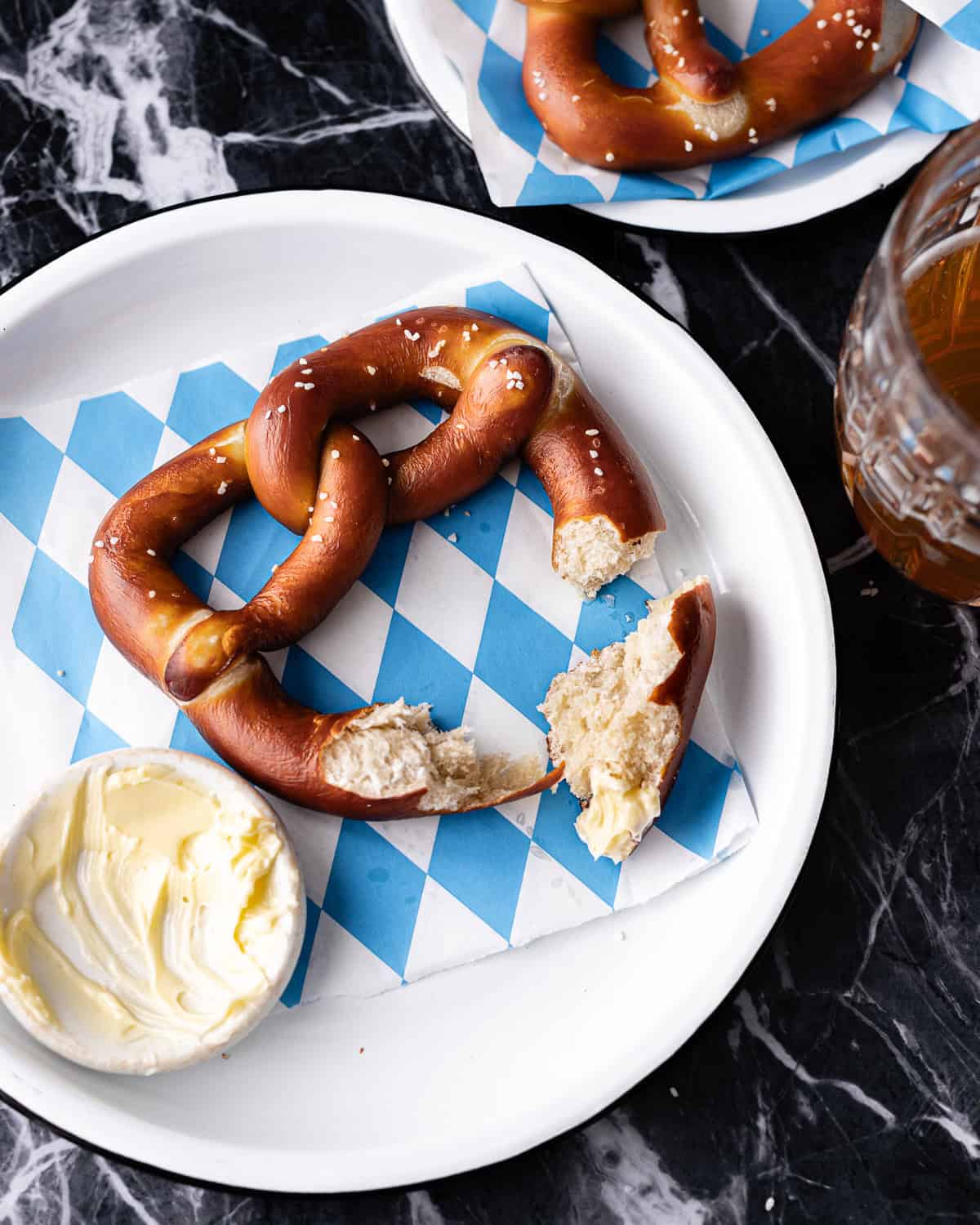
I'm scared to use lye. What can I use instead?
Replicating the rich color and signature flavor of lye pretzels is challenging, but baking soda is a convenient and effective substitute.
How to use baking Soda to make pretzels
- Dissolve ¼ cup of baking soda in very hot water
- Submerge the shaped pretzel dough into baking soda bath for 30 seconds to 1 minute.
- Transfer the dough to a wire rack to drain any excess moisture.
- Top with pretzel salt and score.
- Bake as instructed.
I use this technique on my recipes for Sourdough Discard Pretzel Bites and Sourdough Discard Pretzel Buns, it's a great, safe alternative that yields delicious results.
Recipe FAQs
Absolutely, just substitute vegetable oil or coconut oil for the butter in the recipe.
Baking soda is a great, safe alternative to lye. Although you won't get the exact same results, your pretzels will still turn out delicious. Check out my recipe for Sourdough Discard Soft Pretzels for instructions on how to use a baking soda bath.
In Germany, soft pretzels are traditionally eaten with soft butter and this has become my favorite way to enjoy these, especially when I eat them with homemade cultured butter. Here in the U.S., they are most commonly eaten with mustard or a beer cheese dip.
Once your pretzels have completely cooler, store any leftover in an airtight container, to prevent them from becoming stale, for up to 3 days. For longer term storage, wrap the pretzels in a double-layer of foil and a freezer bag for up to 2 weeks. Reheat pretzels in a 350 F oven for 10 minutes.
More sourdough bread recipes you may like
Did this recipe rise to the occasion?
★★★★★
Please leave a star rating and a comment. Your feedback helps me create more delicious sourdough recipes. I read and truly appreciate every message.
Don't forget to PIN this recipe on Pinterest to save it for later!
Thank you for your support!

Sourdough Pretzels Recipe
Equipment
- Safety Glasses
- Face Mask
- Chemical Resistant Gloves
- Food-grade Lye
- Silicone Baking Mat
- Large Baking Sheet
This section may contain affiliate links
Ingredients
Dough
- 75 grams active sourdough starter
- 14 grams barley malt syrup substitute brown sugar
- 376 grams water
- 660 grams bread flour
- 12 grams salt
- 42 grams unsalted butter softened
Lye Bath
- 900 grams cold water
- 56 grams food grade lye
Topping
- pretzel salt for sprinkling
Click US Customary to view volume measurements
Instructions
Day 1
- Make the dough: Dissolve the sourdough starter and barley malt syrup in the water.376 grams water, 75 grams active sourdough starter, 14 grams barley malt syrup
- Stir the bread flour and salt into the water mixture. Knead the dough until a shaggy dough forms. The dough should feel dry and it may take some time for your dough to come together.660 grams bread flour, 12 grams salt
- Incorporate the butter into the shaggy dough and continue kneading until it is absorbed.42 grams unsalted butter
- Strengthen the dough: Turn the dough out on a clean work surface and knead for 15 to 20 minutes. Developing gluten is key for chewy pretzels so make sure your dough is smooth before you stop kneading.Your dough shouldn’t feel sticky, but if it does, coat your hands and work surface with a little bit of oil.
- Bulk fermentation: Round the dough into a tight ball and place it in a clean, lightly-oiled bowl.
- Cover the bowl with plastic wrap and let the dough rise in a warm place, untouched until doubled in volume, about 4 to 6 hours.
- Cold proof: Deflate the dough, round it into a tight ball. Cover the bowl with plastic wrap and let the dough rest in the refrigerator overnight (8 to 16 hours).
Day 2
- Pre shape the dough: The next day, divide the dough into 8 equal portions.
- Working with one portion of dough at a time, flatten the dough into a rough rectangle. Fold the edges towards the center, turn the dough over and round it into a tight ball.
- Roll the dough tightly into a 6-inch log, place the dough on a baking sheet.
- Cover the baking sheet with plastic wrap to prevent the dough from drying out.
- Continue pre shaping the remaining portions. Let logs rest for 15 minutes.
- Shape pretzels: Working with one portion at a time, roll the dough into a 24 to 28-inch rope with tapered ends.
- To roll out the dough, place one of the logs at the top of your work surface. Apply downward pressure as you roll it toward your body, gradually extending it outward. Try not to roll back and forth and don't attempt to stretch the dough since this will cause it to weaken and tear.
- Grab the tips and form a U shape. Twist the ends, and flip them over. Tack the ends to the sides.
- Transfer the dough a baking sheet and cover with plastic wrap.
- Repeat with the remaining portions of dough.
- Final proof: Let the shaped dough rise covered at room temperature for 1½ to 2 hours or until the dough looks puffy, but not doubled.
- Transfer the shaped dough to the refrigerator and chill uncovered for 1 to 3 hours. This will allow the the dough to form a skin and help it keep its shape when dipped in the lye bath.
- Prep: Preheat your oven to 450 F. Line one 18 by 13 inch baking sheet with parchment paper. Brush a light layer of oil on the parchment, this will prevent the pretzels from getting stuck as they bake. Wipe off any excess, too much oil will fry the bottom of the pretzels.
- Lye bath: In a large glass or stainless steel bowl, dissolve the lye in water, using a stainless steel whisk to ensure it is fully dissolved. Lye is highly caustic, so handle it with great care and avoid splashing900 grams cold water, 56 grams food grade lye
- Using protective gear, carefully dip the cold pretzel dough in the lye solution and submerge for 15 to 20 seconds.
- Transfer the dough to a wire rack and let the pretzels drain for a few minutes.
- Place dough on the prepared baking sheet, make sure the pretzels are not touching. They won’t rise or spread much during baking, so you don’t need to worry too much about spacing.
- Top the pretzels: Sprinkle pretzel salt on pretzels while the surface of the dough is still wet. Score the dough using a lame or a sharp knife.pretzel salt
- Bake the pretzels for 20 to 25 minutes or until the pretzels are evenly browned and the crust is lightly crisp. Halfway through baking, lift the pretzels from the parchment paper using a frying spatula, this will prevent them from getting stuck to the parchment paper.
- Transfer the pretzels to a wire rack.
- Enjoy and store: Enjoy freshly baked pretzels warm with butter or sweet brown mustard. These are best eaten the day they are baked, store any leftover pretzels in an airtight container for up to 3 days.
Tips
These recipes were developed and tested using grams for precise measurements. To increase your chances of success, I recommend investing in a kitchen scale. I've included rough volume estimates (in tablespoons and cups), but they might not be totally accurate.
Remember all ovens are unique, these recipes were tested in my oven which runs cooler than others. You might need to lower the temperature if your bake appears to be browning too quickly. Monitor your bake closely and make adjustments if needed.
Notes
- Make sure your starter is mature, healthy and active before attempting this recipe.
- A whole wheat, rye or white starter will work for this recipe.
- If the dough snaps back while rolling, let it rest for 10 to 15 minutes before continuing.
- Use safety gear and avoid splashing as much as possible when working with lye.
- Grasp the ends of the pretzel dough to ensure they stay attached and prevent the pretzels from unraveling while dipping them in the lye solution.
- Don't dip the pretzels in the lye for too long or your pretzels will end up gummy.
- Lye makes the surface of the dough extremely sticky which can cause the pretzels to get stuck to the parchment paper while they bake. To avoid this, oil the parchment paper lightly with vegetable oil or another type with a high smoke point.
Nutrition
I am not a nutritionist or dietitian, any nutrition information provided is an estimate.

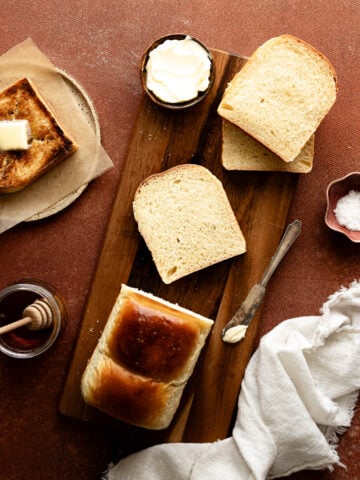
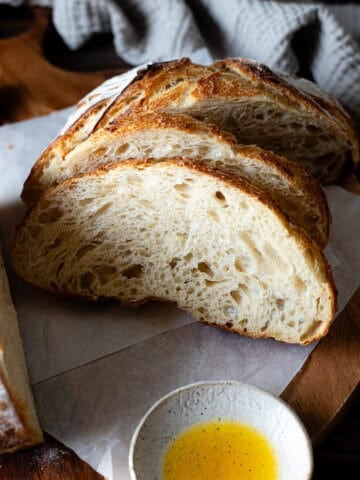
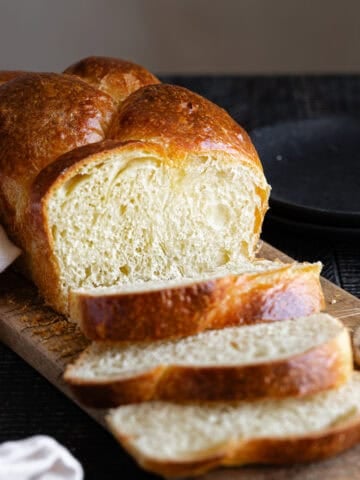
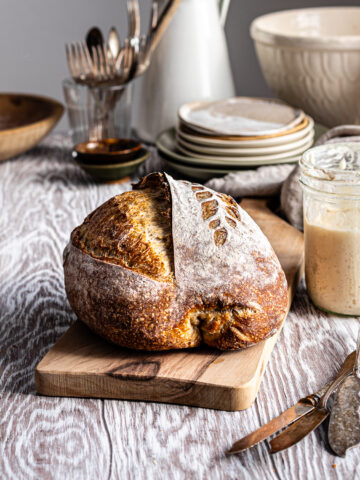
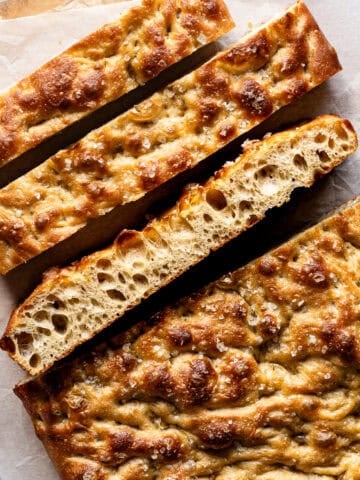
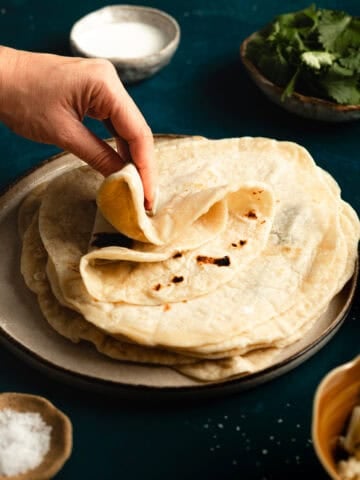
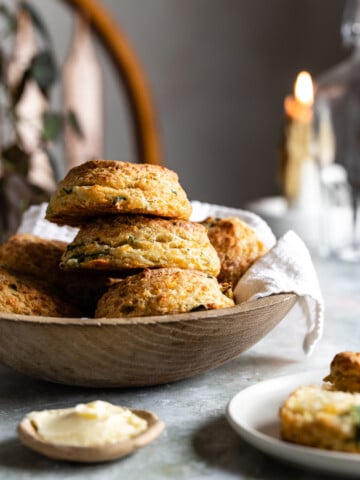
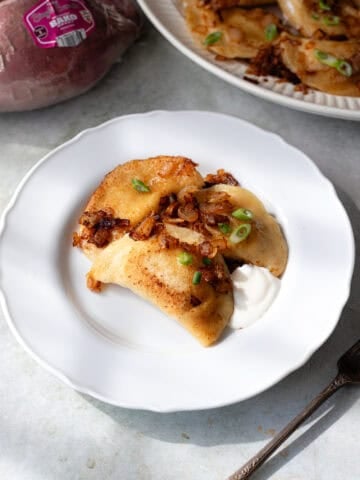
Jasmine says
I just made pretzels for the first time using my starter and I’m so beyond pleased and happy! I’m saving this for sure! The only thing I did different was instead of lye I did a baking soda bath and then egg washed them. They came out beautiful and I ended up making 24 of them 🙂 thank you!
Hannah Dela Cruz says
I am so proud of you for trying this recipe as it's not an easy one! Thanks for trying it out and I am so glad you liked them.